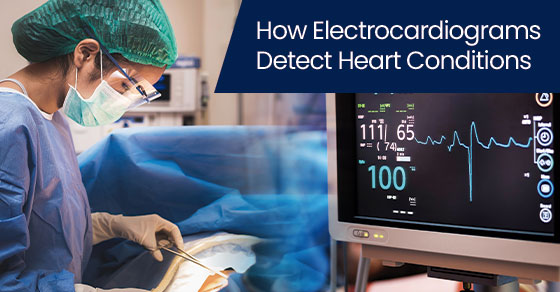How Electrocardiograms Detect Heart Conditions

Electrocardiograms (ECG or EKG) check for heart disease by measuring electrical impulses from your heart. In this procedure, your doctor or a technician places small electrode patches on your legs, chest, and arms. ECGs are extremely valuable in detecting various heart issues; their results are instrumental in your treatment options.
What is an electrocardiogram?
An ECG records the heart’s electrical activity. It provides information relating to heart rate and rhythm.
What does this test do?
ECG can do the following:
- See if there is poor blood flow to the heart (ischemia)
- Check the heart rhythm
- Examine for any abnormalities like thickened heart muscles
- Diagnose heart attacks
- View electrolyte abnormalities like high or low calcium or high potassium levels
If your physician suspects a heart condition, an ECG is the first test you will receive.
Types of Tests
You may have to complete different types of an ECG so your physician can obtain the information they need for an accurate diagnosis. These tests include:
Resting ECG
Resting ECGs are standard and are given while you are lying down. It is conducted in a clinic, hospital, or doctor’s office.
Signal-Averaged ECG
Signal-Averaged ECGs are more detailed. They determine whether you are at a high risk for developing potentially fatal heart arrhythmias. The test captures electrical pulses from the heart over 20 minutes, then averages your readings.
Stress Test
Stress tests are conducted while you exercise on a treadmill or stationary bike. Patients will experience a gradual increase in the intensity of their physical activity so the physician can observe how the heart performs.
Portable ECG
These devices are used when your doctor wants to monitor your heart activity outside their clinic during your daily routine. They may have you use the following devices:
Implantable Loop Monitor
Implantable loop monitors are inserted under the skin of the chest to record continuous heart electrical activity for up to three years. You may need one if your physician suspects issues with your heart’s rhythm or if you faint frequently for unknown reasons.
Normal activities can be conducted with this monitor, including swimming and showering.
Event Monitor
Event monitors are for occasional symptoms. Some monitors require you to push a button to record and store the heart’s electrical signals for several minutes. Other models automatically turn on when they detect irregular heartbeats.
Patients may need to carry or wear one for weeks or months. Some monitors transmit information wirelessly to your doctor.
Holter Monitor
This device examines the heart’s electrical activity 24 hours a day for one to two days. Your physician may recommend it if they think you have an abnormal heart rhythm, limited blood flow to the heart, or palpitations.
Ambulatory/24-hour Electrocardiogram
A small box attached to a belt is placed on a patient and is worn for one day during normal activities. It monitors and records all abnormalities. Patients are requested to record symptoms, which are later assessed by a cardiologist or electrophysiologist.
Electrodes to monitor heart activity are taped to the skin. Once they are in place, you can return home and go about your day. The only activity you cannot do is shower. You will be asked to keep a diary of your activities and any noticeable symptoms.
Discussing Your Results
Your doctor may discuss the results with you the same day you receive the test. Sometimes results are shared during your next appointment. Your physician will examine heart signal patterns found in the ECG results, which provide information about your heart health, including:
- Heart Rhythm: This is the time between heartbeats and the signal pattern between beats. ECGs show arrhythmias (irregular heartbeat), including atrial flutter and atrial fibrillation.
- Heart Rate: Your heart rate is the number of heartbeats in one minute. It can be measured by checking the pulse. ECGs are helpful if the pulse is irregular or difficult to count accurately. They can also diagnose fast heart rates (tachycardia) and slow heart rates (bradycardia).
- Oxygen and Blood Supply to Your Heart: If you are experiencing chest pain, ECGs can help the care team determine whether there is reduced blood flow to the heart.
- Heart Attack: ECGs can diagnose which part of the heart has been damaged.
- Structural Changes: Results offer clues into congenital heart defects, an enlarged heart, and other conditions.
You may be sent for more testing if the ECG detects heartbeat changes.
What does an ECG detect?
The heart’s electrical activity controls your heartbeat. Electrocardiography allows your physician to evaluate the activity, the strength of the electrical activity, and the time that passes between electrical signals. In healthy individuals, heartbeats are consistent and regular.
An ECG may be ordered if there are possible symptoms of heart disease, such as:
- Lightheadedness or dizziness
- Chest pain
- Extreme fatigue
- Shortness of breath
- Irregular or fast heartbeat
- Weakness
The ECG results will determine if there is:
- Enlarged heart chambers
- Abnormal heart rhythms (arrhythmia)
- Narrowed or blocked arteries
- Heart failure
- Heart damage
- Atrial fibrillation
- Past or present heart attack
- Genetic heart defects
- Sick sinus syndrome
- Poor blood supply to your heart
- Wolff-Parkinson-White syndrome
- Heart inflammation (myocarditis)
- Extra fluid or swelling in the sac surrounding the heart
They may also be used to see how well your treatments or heart medications are working. Doctors can also detect whether your heart is healthy enough for upcoming surgery or how well you are recovering after a heart attack.
If the results were normal, am I okay?
You can have normal test results and still have an existing heart condition. You may require additional testing before a proper diagnosis can be made.
Are you concerned about your heart health or need an electrocardiogram?
Aspire Cardiology provides a full range of cardiac services in one location. Our services include electrocardiograms, consultations, stress tests, Holter monitoring, and echocardiograms.
To book your consultation, call us at 647-503-3639 or email us at admin@aspirecardiology.com. Our hours are Monday through Friday, 9:00 a.m. to 5:00 p.m.

